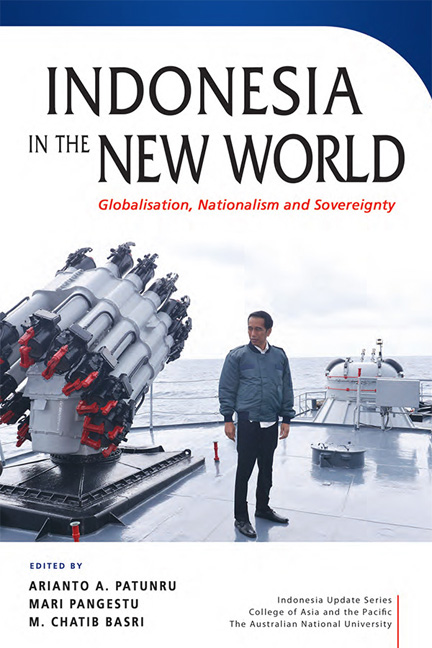Book contents
- Frontmatter
- Contents
- Tables
- Figures
- Contributor
- Acknowledgments
- Glossary
- 1 Challenges for Indonesia in the new world
- PART 1 Globalisation, Nationalism and Sovereignty: the Indonesian Experience
- PART 2 Nationalism in Practice
- 5 Feeding the bangsa: food sovereignty and the state in Indonesia
- 6 Nationalism, developmentalism and politics in Indonesia's mining sector
- 7 Who is afraid of economic openness? People's perceptions of globalisation in Indonesia
- PART 3 Impact of and Response to Globalisation
- PART 4 The Human Face of Globalisation
- PART 5 Navigating The New Globalisation
- Index
- INDONESIA UPDATE SERIES
5 - Feeding the bangsa: food sovereignty and the state in Indonesia
from PART 2 - Nationalism in Practice
Published online by Cambridge University Press: 08 June 2019
- Frontmatter
- Contents
- Tables
- Figures
- Contributor
- Acknowledgments
- Glossary
- 1 Challenges for Indonesia in the new world
- PART 1 Globalisation, Nationalism and Sovereignty: the Indonesian Experience
- PART 2 Nationalism in Practice
- 5 Feeding the bangsa: food sovereignty and the state in Indonesia
- 6 Nationalism, developmentalism and politics in Indonesia's mining sector
- 7 Who is afraid of economic openness? People's perceptions of globalisation in Indonesia
- PART 3 Impact of and Response to Globalisation
- PART 4 The Human Face of Globalisation
- PART 5 Navigating The New Globalisation
- Index
- INDONESIA UPDATE SERIES
Summary
There has been a shift in Indonesian political rhetoric on food policy over the last decade, away from food security (ketahanan pangan) and towards food sovereignty (kedaulatan pangan). This shift is not unique to Indonesia; it reflects a broader movement by activist peasant organisations around the world to emphasise sovereignty over security in relation to food. The way in which the concept is being interpreted and applied by political actors in Indonesia, however, is distinctive, in that it draws strongly on a perceived need to protect the nation—the bangsa—although not neces¬sarily the individual citizens within it.
This chapter examines the processes by which food discourses have been constructed, recast and deployed in Indonesia. The first section looks at the wider global discourses on food security and the second focuses on the history of food policy in Indonesia. The third section explains the more recent embrace of the concept of food sovereignty by the state and addresses the implications of this rhetorical shift for Indonesian food policy.
This discursive arena responds to the very real challenges that Indo¬nesia faces in terms of ensuring that adequate and nutritious food is accessible to a population that exceeds 250 million. The Food and Agri¬culture Organization has estimated that, in 2014–16, Indonesia had 20.3 million undernourished people (FAO et al. 2017: 89). Child malnutrition presents a critical and unresolved challenge for the country, with stunting affecting 37 per cent of Indonesian children aged under five in 2013, com¬pared with only 12 per cent across the entire East Asia and Pacific region (DKP and WFP 2015). Unlike many other indicators of food insecurity, rates of malnutrition have actually worsened in recent years, indicating that current policy is ill equipped to address key nutritional challenges. Patterns of food insecurity in Indonesia have a strong geographical dimen-sion: 52 of the 58 districts identified by Indonesia's Food Security Council (Dewan Ketahanan Pangan) and the World Food Programme in 2015 as ‘severely vulnerable to food and nutrition insecurity’ were located in the far eastern regions of Papua, Maluku and East Nusa Tenggara (DKP and WFP 2015). This raises serious questions about the scale at which food insecurity should be addressed.
- Type
- Chapter
- Information
- Indonesia in the New WorldGlobalisation, Nationalism and Sovereignty, pp. 73 - 89Publisher: ISEAS–Yusof Ishak InstitutePrint publication year: 2018

